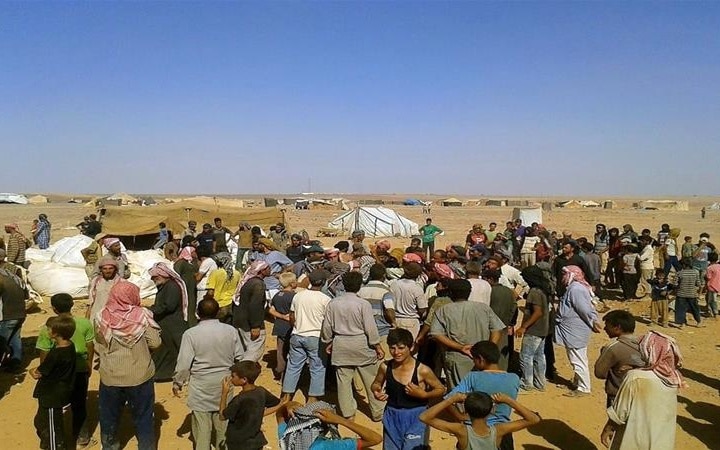Displaced Syrians in the Rubkan camp near the Jordanian border (File)
LATEST
Both the Assad regime and Jordan have cut off food to more 50,000 displaced people in the Rukban camp in southeast Syria, as supplies run out.
Relief workers and refugees said on Thursday that the regime is blocking routes to the camp, near the Syrian-Jordanian border, while Amman is stopping aid deliveries.
“More than a week ago the Syrian regime cut all the routes of supplies towards the camp. There are now only very small amounts of food that smugglers bring,” said Abu Abdullah, the head of the civil affairs council that runs the camp:
The camp is a balloon that could explode at any moment because of hunger, sickness and lack of aid….If the situation continues like this there will be real starvation.
Activist Imad Ghali added, “The factions in the region can not do anything….The prices of food increased up to 200%, and the medical situation has become very bad, with neither doctors nor medicine.”
The Civil Administration in the camp issued a distress call on Monday to Jordan.
But Jordanian Foreign Minister Ayman Safadi has said that Amman is in talks with Russia to dismantle the camp and “encourage voluntary return and create encouraging conditions” to “return its residents to their homes”.
UNICEF: 1000s of Children at Risk
The displaced, mostly women and children, were forced to the barren area of Rukban in 2015 because of Islamic State attacks. Their plight was worsened in June 2016 when Jordan closed the border after an ISIS suicide bombing that killed several Jordanian security personnel.
There has been further pressure this autumn on the civilians to return to what is left of their homes. The UN-run medical facility has been closed, leaving the sick, the injured, and the pregnant to rely on clinics with limited supplies, expensive medicines, and inadequate services.
Syria Daily, Oct 6: Trapped — The Pregnant Women in the Rukban Camp
Since the start of the year, Jordan has blocked aid deliveries, saying that as pro-Assad forces seized territory around Rukban, Amman is no longer responsible.
The UN children’s agency UNICEF warned on Thursday that the lives of thousands of children are at risk unless there is “critical action” by parties to the conflict to “allow and facilitate access”.
Geert Cappelaere, UNICEF’s regional director said, “The situation for the estimated 45,000 people — among them many children — will further worsen with the cold winter months fast approaching, especially when temperatures dip below freezing point in the harsh desert conditions.”
He said two more infants died in the last 48 hours, while relief workers inside the camp said a woman perished this week.
Yazan Aliwi, director of one of the last clinics, said 14 people have died in recent weeks from lack of medical care, including four children, two women, and five elderly.
Amnesty Head “Shocked to Core” by US-Kurds Destruction of Raqqa
Amnesty International’s Secretary General Kumi Naidoo has expressed shock at the destruction in Raqqa in northern Syria, following its captre by the US-backed, Kurdish-led Syrian Democratic Forces from the Islamic State in Ocotber 2017.
On his return from a field visit to the city, Naidoo said:
“What I saw in Raqqa shocked me to my core. The city is a shell — bombed-out buildings, very little running water or electricity, the stench of death hanging in the air.
That anyone is still able to live there defies logic and stands as testimony to the remarkable resilience of the city’s civilians.
He noted, “Attacks by the US-led coalition not only killed hundreds of civilians but also displaced tens of thousands, who are now returning to a city in ruins, while many others languish in camps.”
Naidoo also bemoaned the “similar dire reality…faced by civilian survivors in many other cities where Syrian and Russian forces destroyed hospitals and medical facilities, schools and infrastructure – depriving people of their basic rights, as well as their homes”.
He expressed his fear over Bashar al-Assad’s assertion that the Russian-Turkish demilitarized zone for opposition-held territory in northwest Syria, including Idlib Province, is “temporary”: “[This] only means civilians might not be protected for long, especially those living outside the zone.”

